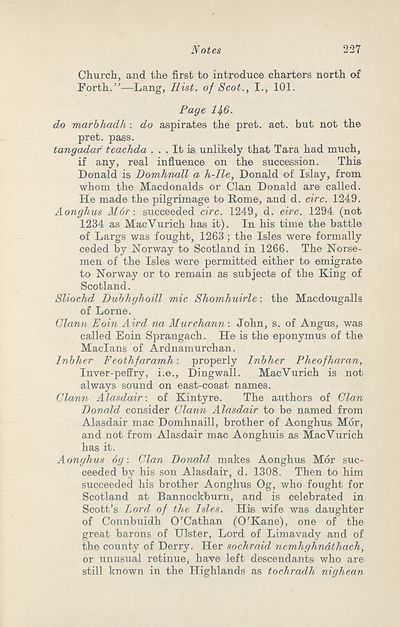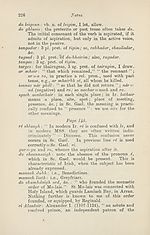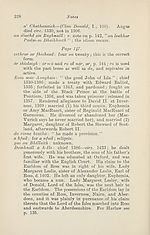Download files
Complete book:
Individual page:
Thumbnail gallery: Grid view | List view

Notes
227
Church, and the first to introduce charters north of
Forth.”—Lang, Hist, of Scot., I., 101.
Page 1^6.
do marbhadh: do aspirates the pret. act. but not the
pret. pass.
tangadaf teachda ... It is unlikely that Tara had much,
if any, real influence on the succession. This
Donald is Domhnall a h-Ile, Donald of Islay, from
whom the Macdonalds or Clan Donald are called.
He made the pilgrimage to Rome, and d. circ. 1249.
Aonghus Mor : succeeded circ. 1249, d. circ. 1294 (not
1234 as MacVurich has it). In his time the battle
of Largs was fought, 1263; the Isles were formally
ceded by Norway to Scotland in 1266. The Norse¬
men of the Isles were permitted either to emigrate
to Norway or to remain as subjects of the King of
Scotland.
Sliochd Dubhghoill mic Shomhuirle: the Macdougalls
of Lome.
Clann Eoin Aird na Murchann: John, s. of Angus, was
called Eoin Sprangach. He is the eponymus of the
Maclans of Ardnamurchan.
Inbher Feothfaramh: properly Inbher Pheofharan,
Inver-peffry, i.e., Dingwall. MacVurich is not
always sound on east-coast names.
Clann Alasdair ■. of Kintyre. The authors of Clan
Donald consider Clann Alasdair to be named from
Alasdair mac Domhnaill, brother of Aonghus Mor,
and not from Alasdair mac Aonghuis as MacVurich
has it.
Aonghus 6g: Clan Donald makes Aonghus Mor suc¬
ceeded by his son Alasdair, d. 1308. Then to him
succeeded his brother Aonghus Og, who fought for
Scotland at Bannockburn, and is celebrated in
Scott’s Lord of the Isles. His wife was daughter
of Connbuidh O’Cathan (O’Kane), one of the
great barons of Ulster, Lord of Limavady and of
the county of Derry. Her sochraid nemhghnAthach,
or unusual retinue, have left descendants who are
still known in the Highlands as tochradh nighean
227
Church, and the first to introduce charters north of
Forth.”—Lang, Hist, of Scot., I., 101.
Page 1^6.
do marbhadh: do aspirates the pret. act. but not the
pret. pass.
tangadaf teachda ... It is unlikely that Tara had much,
if any, real influence on the succession. This
Donald is Domhnall a h-Ile, Donald of Islay, from
whom the Macdonalds or Clan Donald are called.
He made the pilgrimage to Rome, and d. circ. 1249.
Aonghus Mor : succeeded circ. 1249, d. circ. 1294 (not
1234 as MacVurich has it). In his time the battle
of Largs was fought, 1263; the Isles were formally
ceded by Norway to Scotland in 1266. The Norse¬
men of the Isles were permitted either to emigrate
to Norway or to remain as subjects of the King of
Scotland.
Sliochd Dubhghoill mic Shomhuirle: the Macdougalls
of Lome.
Clann Eoin Aird na Murchann: John, s. of Angus, was
called Eoin Sprangach. He is the eponymus of the
Maclans of Ardnamurchan.
Inbher Feothfaramh: properly Inbher Pheofharan,
Inver-peffry, i.e., Dingwall. MacVurich is not
always sound on east-coast names.
Clann Alasdair ■. of Kintyre. The authors of Clan
Donald consider Clann Alasdair to be named from
Alasdair mac Domhnaill, brother of Aonghus Mor,
and not from Alasdair mac Aonghuis as MacVurich
has it.
Aonghus 6g: Clan Donald makes Aonghus Mor suc¬
ceeded by his son Alasdair, d. 1308. Then to him
succeeded his brother Aonghus Og, who fought for
Scotland at Bannockburn, and is celebrated in
Scott’s Lord of the Isles. His wife was daughter
of Connbuidh O’Cathan (O’Kane), one of the
great barons of Ulster, Lord of Limavady and of
the county of Derry. Her sochraid nemhghnAthach,
or unusual retinue, have left descendants who are
still known in the Highlands as tochradh nighean
Set display mode to:
![]() Universal Viewer |
Universal Viewer | ![]() Mirador |
Large image | Transcription
Mirador |
Large image | Transcription
| An Comunn Gàidhealach > An Comunn Gàidhealach Publications > Rosg Gaidhlig > (243) |
|---|
| Permanent URL | https://digital.nls.uk/126280304 |
|---|
| Description | This contains items published by An Comunn, which are not specifically Mòd-related. It includes journals, annual reports and corporate documents, policy statements, educational resources and published plays and literature. It is arranged alphabetically by title. |
|---|
| Description | A collection of over 400 items published by An Comunn Gàidhealach, the organisation which promotes Gaelic language and culture and organises the Royal National Mòd. Dating from 1891 up to the present day, the collection includes journals and newspapers, annual reports, educational materials, national Mòd programmes, published Mòd literature and music. |
|---|---|
| Additional NLS resources: |
|

